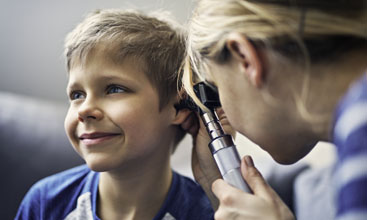Ear conditions
There are a variety of conditions that can affect your ears. Most do not cause major problems, but some can have a significant impact on your quality of life and may need treatment.
Earwax
We all have earwax: it's an important way in which our body prevents infections of the ear. It protects the ear by trapping dirt and repelling water, stopping them from entering the ear canal.
Most of the time, earwax does not cause any problems so there's no need to remove it. But, occasionally, it can build up and form a 'plug' in the ear that may cause pain or hearing loss.
You might be tempted to insert something into your ear to remove any wax, such as cotton buds or even a matchstick. But this can be dangerous and you risk perforating your eardrum.
We offer a number of treatment options, including quick and painless microsuction.
Glue ear and grommets
Glue ear is a condition where the middle ear fills with fluid. It's common in childhood and often flares up in winter.
Glue ear usually goes away on its own, but, occasionally, it can cause problems such as hearing loss in one or both ears. Here are some signs that your child may be having hearing problems
It might go away on its own, but if it doesn't the usual treatment is to drain the fluid from the ear. This is done by placing tubes (known as grommets) in the ear, which drain the fluid away. This is a routine surgical procedure, so you should not worry if your child needs to have this done.
Hearing loss
Hearing loss is a common condition and can affect people of all ages. It's not unusual to lose our hearing as we get older, but children can also be affected. Hearing loss may have a clear cause, such as glue ear in children, or it may need further investigation such as a hearing test to diagnose the cause.
The treatment for hearing loss depends on its cause. For example, if your child has glue ear, their symptoms may disappear on their own and not require any treatment. Sometimes minor surgery may be needed to correct the problem. Hearing aids are also a very helpful way for you to manage any hearing loss and they have improved enormously over the last few years. Some of the very latest designs can only be seen by looking directly into your ear. Which of course doesn't happen.
Our ENT specialists can help you with hearing loss. They'll discuss your symptoms in detail and will carry out routine tests and examinations to understand the cause of your condition and suggest the right treatments for you.
Vertigo, dizziness and balance disorders
Vertigo is a feeling of dizziness and losing your balance. You may feel as if you or the room you're in is spinning around and moving. The feeling may be barely noticeable or it may cause you to feel unsteady or lose your balance. It may happen for just a few seconds, or it could last longer.
Feelings of dizziness and losing your balance are symptoms and not a condition. So, treatments depend on the cause. For example, vertigo may be caused by a problem with the part of your ear that controls balance, or it may be caused by an infection or migraine.









.jpg)


